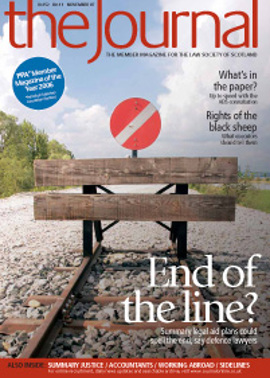The shape of your future

Top forum
The Opening of the Legal Year at Westminster is a glittering occasion. The event brings together lawyers from around the world and provides an invaluable opportunity to share views and learn from the experiences of others. This year and as part of the event the Law Society of England & Wales and the Bar Council held a forum at Lincoln’s Inn, and it will come as no surprise that the subject of alternative business structures dominated the agenda. One of the sessions discussed the issue “New forms of legal practice. Can they be satisfactorily regulated?” That issue of course dominates the ABS debate here and you will see it marked out as a critical issue in our consultation paper “The Public Interest: Delivering Scottish Legal Services – A Consultation on Alternative Business Structures”, which has now been sent to all members and is on the Society’s website.
During the Lincoln’s Inn seminar people remarked on the way the legal landscape is changing worldwide, on how quality of management will have to equal quality of advice, on commoditisation of services and global provision. We know that the market is changing. Richard Susskind in a recent article in the Times asserts that the legal profession is on the brink of fundamental change. He questions whether the role of the traditional lawyer can be sustained in coming years in the face of challenging trends in the legal marketplace and new techniques for the delivery of legal services.
What kind of future?
The Society’s consultation paper highlights the fundamental principles of the Scottish legal profession. I think that we have to have those ideas constantly in mind especially when discussing matters as important as those raised by the ABS debate. In looking at practice structures and their effective regulation, we have to ask questions which touch on the core values of the profession; what is it that we are actually trying to regulate?
Whether there is a profession depends principally on whether we subscribe to fundamental principles and core values. The consultation document seeks to identify options for alternative business structures which maintain the profession’s core values. It is important that lawyers uphold those principles and that clients value them as important public safeguards.
An independent legal profession is not only a cornerstone of a civilised and democratic society. It is also central to any successful democratic society. At the Lincoln’s Inn event one contributor commented that the historical role of the lawyer is to act as the ethical check for clients. Richard Susskind’s book is entitled The End of Lawyers? But the important issue is in the second part of the title: Rethinking the nature of legal services.
The consultation paper also allows us to address not only the issue of ABS but the far deeper issue of whether we want a legal profession, and if so, what it might look like. I would not want to comment on the underlying thesis in Richard Susskind’s book until I have had an opportunity to read the entire work, but I think that the proposition that we stand on the brink of fundamental change is beyond dispute.
In the Society we want to plan for that changed world, and we want to engage both with the profession and more widely to secure an outcome most likely to meet the needs of the profession and their clients and of Scotland as a whole.
I would challenge all members to become involved in shaping the future of their profession by responding to the consultation.
Support Will Relief
Another opportunity for solicitors to get involved is the second Will Relief Scotland scheme, which is taking place throughout this month of November. This event, which involves solicitors waiving their fees for drawing up wills in exchange for a donation to nominated overseas aid charities, provides valuable benefits to all concerned: not only is it a fundraiser for needy charities, but solicitors benefit from new clients and earn goodwill, while members of the public get a will drawn up professionally without paying legal fees. The organiser, Oban solicitor Graeme Pagan, has urged more solicitors to register for the scheme. I would wholeheartedly endorse his request. Further details can be found at the websites of Will Relief Scotland and the Society.
In this issue
- The shape of your future
- The law and the forum
- End of the line?
- Summary justice: the big picture
- Now it's your turn
- Flying south
- Legal rights and the black sheep
- Mediation innovation
- Counting on your CA
- The risk of paper cuts
- Society hits the Net at Murrayfield
- Leading the charge
- Computer says no
- Who, what, where, when, why?
- Getting in on the Act
- Scottish Solicitors' Discipline Tribunal
- Website reviews
- Book reviews
- Well funded work
- PSG offers an offer






